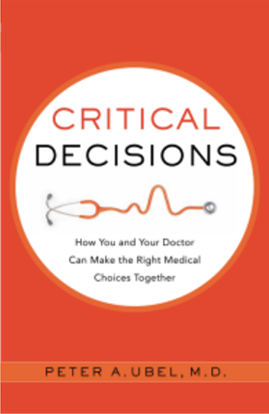ABOUT THE BOOK:
We’ve all been there, sitting uncomfortably in a paper gown as a doctor impassively describes our prognosis. Sometimes it’s simple and treatable. Other times we get news we can’t fathom and then are faced with decisions that are literally life and death.
In this revolutionary book, physician, behavioral scientist, and bioethicist Peter Ubel, M.D., reveals how hidden dynamics in the doctor/patient relationship keep us and our loved ones from making the best medical choices. From doctors who struggle to explain to patients how fail to properly listen, countless factors alter the course of our care, causing things to go seriously awry.
With riveting stories of Ubel’s own experience in the field, his groundbreaking research, and his personal journey walking oved ones through difficult treatment choices, Critical Decisions will forever change the way we communicate inside hospitals and medical offices, where thoughtful decision making matters the most. Dr. Ubel has been on both ends of the stethoscope, and in this book, he shows how patients and doctors can learn to become partners and work together to make the right choices. From choosing to get surgery, to discussing the side effects of a blood pressure medication, we can finally discover the tools to improve communication, understand the issues and make confident decisions for our future health and happiness.
EXCERPT:
Read Prologue: Who’s in Charge?
WHAT OTHERS ARE SAYING:
“Decisions affecting our health and our loved ones’ are some of the most important that we make. As a physician and social scientist Peter Ubel is unparalleled in his understanding of the influences that guide our medical decisions and, here, he shows us how we can make better decisions.”
– DAN ARIELY, bestselling author of The Honest Truth About Dishonesty and Predictably Irrational
“There are few topics more in need of a book in the choice-loving U.S. than ‘who decides’ when it comes to medical decision-making. And there is no person alive better equipped to write such a book than Peter Ubel. And he writes beautifully.”
– BARRY SCHWARTZ, author of The Paradox of Choice and Practical Wisdom
“Peter Ubel is a top-notch scientist and writer. His ideas are important, his style is accessible (with the right balance of humor and compassion), and his topic is timely. We need someone like Peter—no, we need Peter—to help us sort out how patients and their doctors can better work together to make these important decisions.”
– DANIEL GILBERT, author of Stumbling on Happiness
“Peter Ubel’s writing is riveting. This book asks some of the most profound questions of our time. Are we equipped, as humans, to make the choice of whether to live or die? What is more important, quality or quantity of life? Is anyone—be it an individual for him—or herself or deciding on behalf of another—equipped to make such decisions? This book will be must reading for serious readers!”
– SHEENA S. IYENGAR, author of The Art of Choosing
WHY I WROTE THE BOOK:
The diagnosis is prostate cancer. The patient, overwhelmed by the bad news, has to figure out the relative pros and cons of surgery, radiation and ‘watchful waiting’.
The young woman is in a persistent vegetative state. Her parents decide that it is time to take her off the ventilator that is keeping her alive. But her doctor refuses.
The operation will slow the patient’s death, not cure her. Partway through the procedure, her surgeon realizes that removing her throat tumor will leave her without speech but that halting the surgery will expose her to infection. Should he continue to operate?
What are the best medical choices for these people? For us? Who should be making these critical decisions?
Health care has come a long way since the days when doctors withheld bad news and made every decision in patient treatment. In today’s world of “patient empowerment,” patients have been told they hold all the cards. But even if that were true (and it’s not!), most wouldn’t know how to play them anyway.
In this book I show how hidden dynamics in the doctor/patient relationship keep us, and our loved ones, from making the best medical choices. From doctors who struggle to explain, to patients who fail to properly listen, countless factors alter the course of our care, causing things to go seriously awry.
I discuss how patients and doctors can learn to become partners, and work together to make the right choices. From whether to get surgery to deciding whether the side effects of a blood pressure medication are worth the trouble, we can discover the tools to improve communication, understand the issues, and make confident decisions for our future health and happiness.

